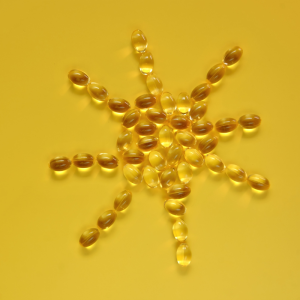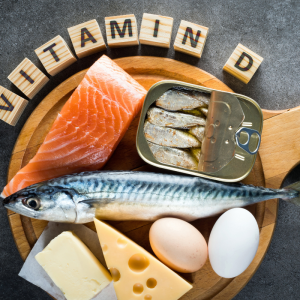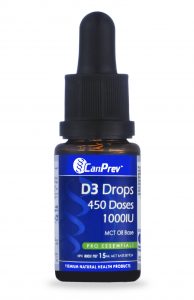 To D or not to D – that is the question. I’m referring, of course, to vitamin D and whether it’s a good idea to take a vitamin D supplement. Here are some multiple choice answers for you to ponder:
To D or not to D – that is the question. I’m referring, of course, to vitamin D and whether it’s a good idea to take a vitamin D supplement. Here are some multiple choice answers for you to ponder:
- a) always
- b) by no means
- c) capsule form only
- d) definitely in the dark days of winter!
So, to D or not to D. That is the question. And the answer is …
d) definitely in the dark days of winter.
Read on for more about why it’s important to supplement vitamin D.
It’s difficult to dine out on D
 Unlike many vitamins, it is difficult to obtain sufficient vitamin D though our diet alone. And the only good food sources are animal products.
Unlike many vitamins, it is difficult to obtain sufficient vitamin D though our diet alone. And the only good food sources are animal products.
Of these, the richest sources are fatty fish (and cod liver oil…yum!). To a lesser extent, beef liver, egg yolks and milk (and, to an even lesser extent, cheese) contain some vitamin D. So vegetarians, and vegans in particular, will find it virtually impossible to take in sufficient quantities of vitamin D from what’s on their plates.
Your body can make all the vitamin D it needs if conditions are right
Thankfully, the human body doesn’t really need to get vitamin D from the diet. It is quite adept at synthesizing it from the cholesterol in your skin in the presence of sunlight. Your body can produce 10,000 to 25,000 IU of vitamin D in just a little under the time it takes for your skin to begin to burn in the sun. For me, that is about fifteen minutes.
The amount produced depends on the time of day, how much of your skin is exposed, where you live and how fair/dark your skin is. I am very fair so my skin is quite quick to produce it. Once made, a two-step process (in the liver and then the kidneys) activates it to its biologically active form.
It is important to note that the sun must be sufficiently strong and your skin must not be slathered with sunscreen, which blocks the UVB light required. Just 15 to 20 minutes of “unprotected sun” early in the day is sufficient.
Definitely supplement during the winter
During Canada’s deep, dark winter months (approximately November through March), the sun isn’t strong enough to make much vitamin D. And most of us aren’t too keen on exposing our skin to the elements at chilly fall and winter temperatures either. At this time of year, supplementation is the name of the game. So now is a very good time to dial up your vitamin D if you haven’t already.
Another thing to note is that older adults become less efficient at making vitamin D from skin exposed to sunlight. The kidneys of older adults are also less able to convert vitamin D to its active form. So the elderly may wish to consider year-round supplementation. As should anyone, regardless of age, who is always covered up or wearing sunscreen when outdoors.
Why is it so important to supplement Vitamin D?
Vitamin D contributes to so many processes in the body it is thought of as more of a multifunctional hormone. In fact, almost every cell has receptors for vitamin D. Here’s just a sample of what sufficient vitamin D will do for you:
Keep your bones healthy. Vitamin D enhances your gut’s absorption of calcium and phosphorous, helps regulate their levels in the blood and promotes remineralization of bone. Without vitamin D, you could binge out on calcium-rich foods in your diet and it won’t get into your bones. So insufficient vitamin D increases the risk of osteopenia and osteoporosis. Also, studies show that elderly populations that have supplemented vitamin D for a period of years tend to have significantly less falls (likely as a result of its role in neuromuscular function), reducing risk of bone fracture. See below for more about considering a supplement that also includes vitamin K for bone health.
Boost your immunity. Vitamin D insufficiencies tend to be associated with most infectious illnesses. Further, daily supplementation of vitamin D seems to lower the risk of several upper respiratory tract infections. Something to consider as we move indoors and become more exposed to various viral infections.
Regulate your blood sugar. Vitamin D appears to enhance the secretion and function of insulin, the hormone which allows your body to use carbohydrates for energy and controls your blood sugar. Studies show that people with low vitamin D levels are more likely to be obese.
Help prevent depression. Research shows that vitamin D helps regulate epinephrine and norepinephrine and dopamine production in the brain. It also helps protect serotonin from becoming depleted. Serotonin is one of the so-called “happy hormones”, which regulates mood as well as sleep and appetite. Insufficient vitamin D levels appear to increase risk of depression.
How much Vitamin D do I need?
 Vitamin D is fat-soluble, which means your body can store it. Health Canada guidelines suggest staying below 4,000 IU per day (from food and supplements, combined). For moderate supplementation, a 1,000–2,000 IU dose of vitamin D3 is sufficient to meet the needs of most of the population. Higher daily doses are in the range of 20–80 IU per kilogram of body weight. Speak to your health care practitioner before taking supplements as they can advise you on the right amount for you. Be sure that your supplement is the D3 (cholecalciferol) form. This is recommended over the D2 (ergocalciferol) form for supplementation because D3 tends to raise blood levels more effectively.
Vitamin D is fat-soluble, which means your body can store it. Health Canada guidelines suggest staying below 4,000 IU per day (from food and supplements, combined). For moderate supplementation, a 1,000–2,000 IU dose of vitamin D3 is sufficient to meet the needs of most of the population. Higher daily doses are in the range of 20–80 IU per kilogram of body weight. Speak to your health care practitioner before taking supplements as they can advise you on the right amount for you. Be sure that your supplement is the D3 (cholecalciferol) form. This is recommended over the D2 (ergocalciferol) form for supplementation because D3 tends to raise blood levels more effectively.
Consider a supplement that includes vitamin K2
When it comes to bone health, vitamin K2 works synergistically with vitamin D. Whereas vitamin D enhances the absorption of calcium from the food you eat, vitamin K2 helps control where that calcium shows up. It does this by activating a protein called osteocalcin, which promotes the accumulation of calcium in your bones. And it activates another protein that prevents calcium from accumulating in soft tissues like blood vessels.
 Vitamin K2 is mainly found in foods that most people don’t eat much of. One of the richest sources is natto, a traditional Japanese dish of fermented soybeans (pictured at right). It has a slimy, sticky and stringy texture (some liken it to snot) and a rather pungent smell. Let’s just say it’s an acquired taste (one I haven’t acquired). It is very nutritious, however. Sauerkraut and miso, also fermented products, are other plant sources of K2. Animal sources include high fat dairy products from grass-fed cows, egg yolks and organ meats such as liver. Given many of us don’t consume these in quantity, you may wish to consider supplementing vitamin K2 as well. There are now several vitamin D3 supplements that include K2 in their formulations, like this one from CanPrev, if you’d rather just take one supplement to cover both bases.
Vitamin K2 is mainly found in foods that most people don’t eat much of. One of the richest sources is natto, a traditional Japanese dish of fermented soybeans (pictured at right). It has a slimy, sticky and stringy texture (some liken it to snot) and a rather pungent smell. Let’s just say it’s an acquired taste (one I haven’t acquired). It is very nutritious, however. Sauerkraut and miso, also fermented products, are other plant sources of K2. Animal sources include high fat dairy products from grass-fed cows, egg yolks and organ meats such as liver. Given many of us don’t consume these in quantity, you may wish to consider supplementing vitamin K2 as well. There are now several vitamin D3 supplements that include K2 in their formulations, like this one from CanPrev, if you’d rather just take one supplement to cover both bases.
Drops, capsules or tablets?
Vitamin D requires fat to be absorbed by the body. So if you’re taking your supplement in tablet form, it is important to take it along with a meal that contains fat. If your supplement contains fat as part of the formulation (as many drops and gel capsules do), it isn’t as critical to consume it with food. As liquid supplements are more readily absorbed by the body, I tend to favour drops. They are also more cost effective. But I sometimes use capsules when travelling as they are more easily transported in just the quantity I need. In a nutshell, choose the form of supplement that you are most likely to remember to take because the most important thing is to take your vitamin D supplement daily.
Want to receive blog posts from The Nutritional Reset direct to your inbox?
Join The Nutritional Reset community here to receive upcoming blog posts,
exclusive recipes and more, direct to your inbox!
Find out more about how The Nutritional Reset can restore your energy & enthusiasm for life here.